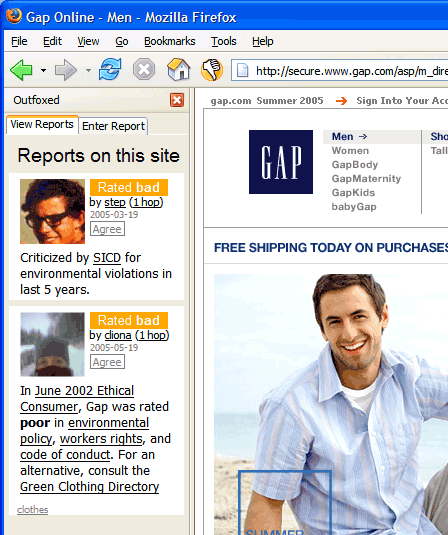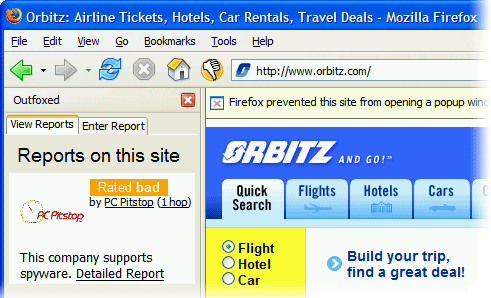Socially aware surfing and shopping
Although originally designed to combat phishing and spyware websites, the metadata that is distributed via Outfoxed can be about anything. For example, suppose that Jane is environmentally conscious and would prefer to do her shopping at eco-friendly businesses. On a small scale, Outfoxed allows her to give reports, positive and negative, on businesses that she has encountered in the past. When a friend of hers encounters this business online, the friend will know Jane's opinion. On a larger scale, Outfoxed allows organizations (or activists) to publish massive directories of positive/negative reviews.
 These screenshots show how Outfoxed is already being used to distribute this type of information. In the top screenshot, two informers have entered reports about Gap, and have included links to more information.
These screenshots show how Outfoxed is already being used to distribute this type of information. In the top screenshot, two informers have entered reports about Gap, and have included links to more information.

In the second screenshot we see information from PC Pitstop about companies that advertise via Spyware. Note the "thumbs down" next to the browser address bar. Clicking on this button opens the sidebar, where the full text of the report can be seen. In this case, the report contains a link to a page explaining how the information was gathered.
There is no limit to the variety of information that can be distributed via Outfoxed. Other immediate possibilities include information about political ties, use of open-source software, quality of construction, and price comparisons.
The power of distributed classification
It is a risky move for a small or non-profit organization to classify a product or company as "bad". A company with enough money and lawyers can bully just about anyone into being quiet. (Even Microsoft can be bullied at times.) But imagine instead that their were hundreds and thousands of individuals all giving the same classification, and sharing their opinions via a social network like Outfoxed. The bully now has two problems. First, they now they have many more targets and must divide their efforts. This makes bullying too expensive. Second, the targets are now individuals and would-be customers. This makes bullying into a bad PR move.
The success of illegal peer-to-peer filesharing is due to this same quality. If a few websites are distributing pirated MP3's, it is not too much trouble for a comapany to find them and shut them down. But if hundreds of thousands of individuals are sharing, shutting them down becomes nearly impossible. This is even more true when the individuals are not engaging in piracry, but simply voicing their opinions. To use the Weatherbug example again, AOL may be able to indimidate Microsoft, but they could not bully thousands of computer users for sharing their opinion that Weatherbug is a crappy program.
[TODO: Positive example where Outfoxed promotes good-rated product to top of search results.]


